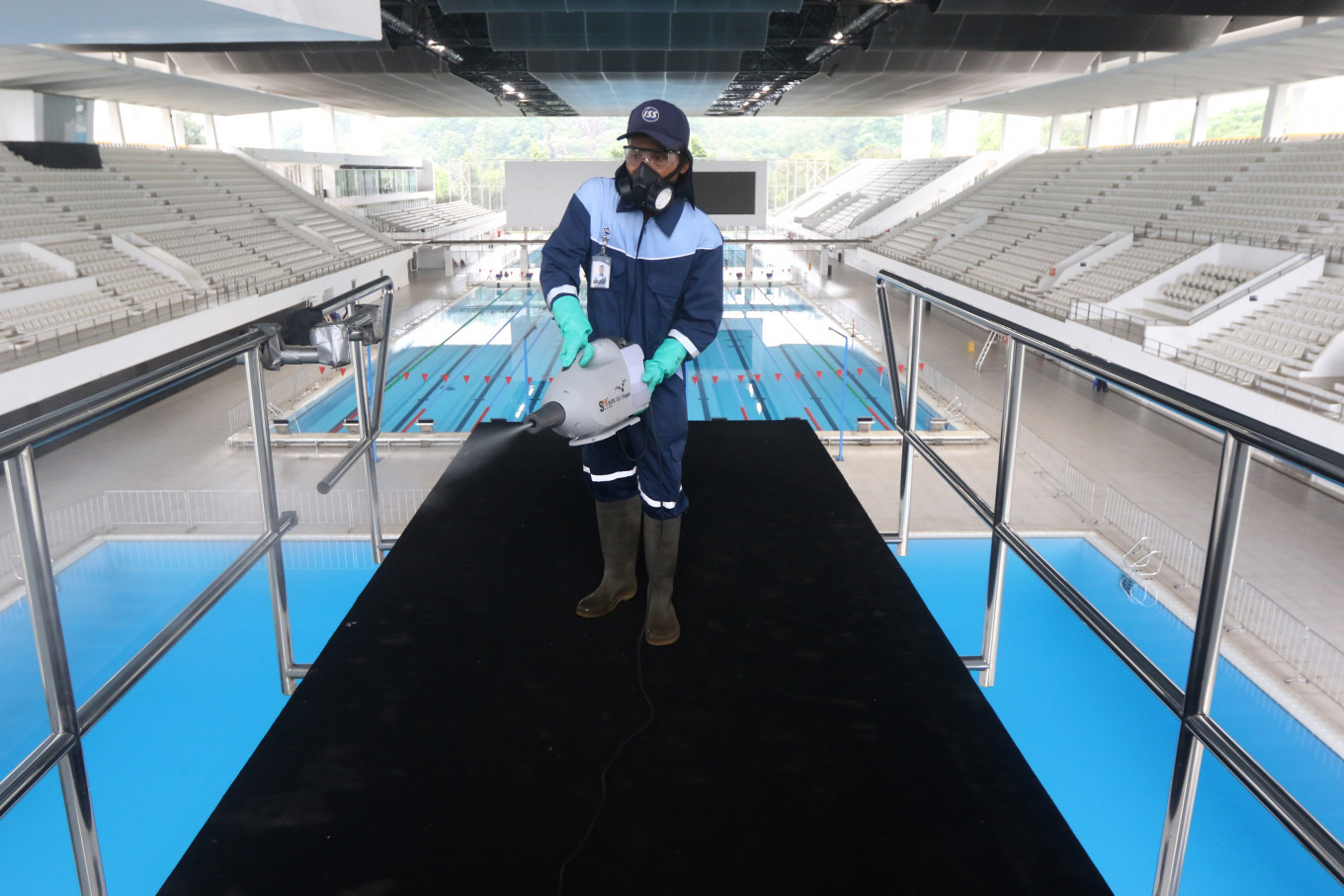Jokowi nixes lockdown, opts for mass testing
Rapid tests are easier to perform than regular polymerase chain reaction (PCR) tests.
Change Size
 An officer sprays disinfectant at Bung Karno Aquatic Stadium, Jakarta, on Wednesday, March 18, 2020. (JP/ Dhoni Setiawan)
An officer sprays disinfectant at Bung Karno Aquatic Stadium, Jakarta, on Wednesday, March 18, 2020. (JP/ Dhoni Setiawan)
P
resident Joko “Jokowi” Widodo has ruled out the possibility of imposing a lockdown on the virus-stricken capital and has instead ordered mass testing to contain the spread of the novel coronavirus disease (COVID-19), which has claimed thousands of lives worldwide.
The decision has come at a critical time for Indonesia, which now finds itself in danger of a massive outbreak that could overwhelm hospitals and medical officers, just a short time after government health authorities claimed that the nation of 270 million people was free of the virus.
Up until Thursday, Indonesia recorded 309 cases with 25 deaths, the highest toll in Southeast Asia, a region that was mistakenly thought to be less prone to the lethal virus due to its tropical climate. Nearly 70 percent of COVID-19 deaths in the country have been recorded in Jakarta, according to the Jakarta administration.
“I demand rapid tests be carried out across the country for early detection of infection,” Jokowi said during a limited meeting at the State Palace on Thursday. “I also want more test kits to be distributed to medical laboratories and more laboratories to conduct the tests.”
Read also: People with COVID-19 symptoms still need to perform full tests: Health Ministry
Rapid tests are easier to perform than regular polymerase chain reaction (PCR) tests. They require only blood serum as a sample, meaning the tests could be performed at all health laboratories across the country. Everyone, whether they have shown COVID-19 symptoms or not, could be tested.
During the meeting, the President urged hospitals to prepare contingency plans in case they were overwhelmed by patients. Hospitals have been advised to use the athletes’ apartment complex in Kemayoran, Central Jakarta, which can accommodate 15,000 people, and state-owned hotels as emergency wards.
“I am instructing hospitals to devise a clear contingency plan while we accelerate construction of the COVID-19 hospital on Galang Island in the Riau Islands,” he said.
The National Disaster Mitigation Agency (BNPB), which has spearheaded the government’s fast-response team to contain COVID-19, will roll out rapid test procedures and ask stakeholders, such as private hospitals and research institutions, to identify possible cases as soon as possible.
Read also: COVID-19: Does Indonesia need a lockdown? It depends on how you define it
The agency asserted that the country was not in a lockdown but that the government would push people to be more disciplined in practicing social distancing. “We have to comply with the central government. The President will not give lockdown status,” said BNPB head Doni Monardo. “Social distancing is enough. If it is obeyed then we can limit transmission. If it is not being followed faithfully then any measures [taken to contain the disease] will not succeed.”
Experts have expressed their support of the government’s plan to implement rapid testing procedures but have added that it will not be enough to properly contain the virus.
Nurul Nadia Luntungan, a public health expert at the Center for Indonesia’s Strategic Development Initiatives said that for regions with apparent community transmission, such as Jakarta, a partial lockdown could be imposed in parallel with mass testing efforts.
Nurul considered a lockdown necessary to prevent the virus from spreading within the city and into more regions across the country, given the high mobility of people in Jakarta.
She added that the dual measure would aim to flatten the curve of COVID-19 transmission, meaning that the outbreak would be slowed down, thereby lowering the possibility of transmission to high-risk populations and easing the burden on the country’s already limited healthcare system. “We have now seen a spike in cases in healthcare facilities, and after discussing with medical workers on the field, they’ve expressed their worry about the lack of safety and protective gear.”
Ahmad Utomo, an investigator at the Stem Cell and Cancer Research Institute in Jakarta said that a lockdown would be necessary to “buy time” as the government was only now trying to fix its diagnostic procedures by implementing rapid tests.
He said that in addition to the new measure, which he considered too late, the government should still import more PCR test kits as it could not rely solely on rapid tests for containment efforts. Rapid tests, however, could be usefully implemented at entry points to the country, he added, as results would be available quickly and the kits were cheaper than those for PCR testing.
Read also: Indonesia to welcome foreign help in support of nationwide COVID-19 rapid tests
Panji Fortuna Hadisoemarto, an epidemiologist at Padjajaran University, said that rapid testing would only effectively suppress transmission if follow-up measures, such as isolation for positive cases and massive contact tracing, were undertaken.
Details of patients’ travel history, he said, should also be disclosed to the public, so that those in contact could self-isolate or report themselves to further suppress transmission. Such data could also be used to determine whether a lockdown should be implemented, as such a measure had been proven to slow transmission elsewhere, Panji said.
The Jakarta administration, meanwhile, is conducting a campaign to enhance social distancing by working with subdistrict heads to ensure that no mass gatherings occur in the province and that all residents are informed about the virus and prevention methods.
Jakarta Governor Anies Baswedan also announced the postponement for two weeks of Friday mass prayers for Muslims and church services for Christians in Jakarta.









